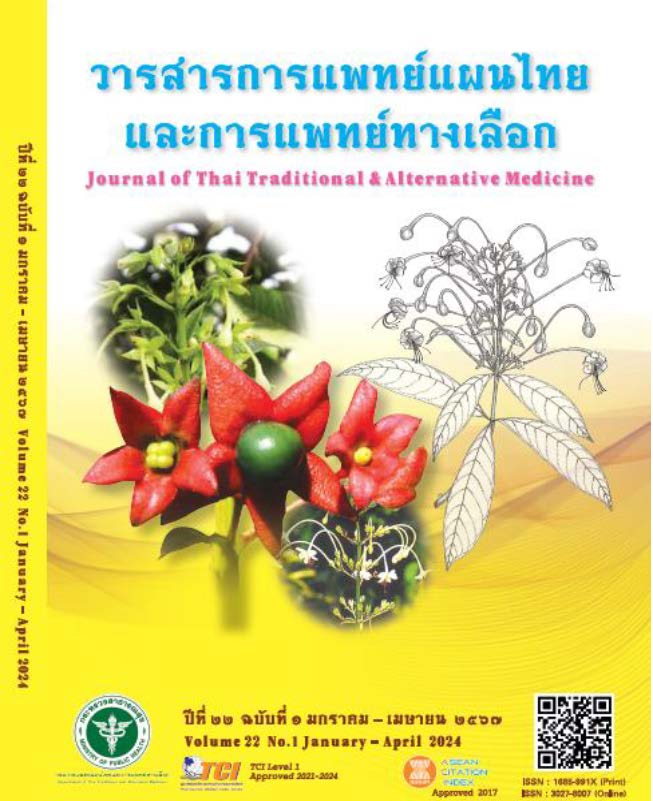Development of Electronic Book (E-book) on Foot Massage
Main Article Content
Abstract
Introduction and Objective: Currently, massage therapy education on foot reflexology is incorporated
into various educational institutions that offer instruction in Thai traditional medicine (TTM). The aforementioned reasons have prompted the research team to conceive the idea of developing an electronic book (e-book) on foot reflexology. The aim is to stimulate interest and enhance learning among students, increasing their knowledge and understanding of the science of foot massage. The objectives of this study are (1) to develop an e-book on foot reflexology and (2) to assess the quality of the e-book on foot reflexology.
Methods: The research team reviewed the literature and analyzed the content from textbooks on foot massage for use in the design and development of an e-book on foot massage. The draft e-book’s quality was assessed by seven experts who are knowledgeable about and teachers of foot massage. Based on the experts’ advice, the e-book was revised/finalized accordingly. Statistics used to analyze the data were mean, percentage and standard deviation.
Results: The quality assessment showed the overall results at a good level (Mean = 4.09, S.D. = 0.95),
the efficiency at a good level (Mean = 4.45, S.D. = 0.75), the language at a good level (Mean = 4.33, S.D. = 0.55),
the content at a good level (Mean = 3.87, S.D. = 1.51) and the images/videos at a good level (Mean = 4.73, S.D. = 1.01).
Discussion: The newly developed e-book on foot massage will be a guideline for instructional development in the Bachelor of Thai Traditional Medicine program or for studies on Thai traditional medicine.
Conclusion and Recommendation: Based on the e-book’s quality assessment conducted by TTM experts
in four aspects (content, language, images/videos, and efficiency), the qualities were at a good level. Thus, the
e-book may serve as a guideline for the development of teaching materials in the TTM curriculum or program, or for studies on Thai traditional medicine. This is particularly relevant as current teaching documents, textbooks, and references have been in use for a long time, and some content or language may be outdated. To enhance student engagement, there should be a focus on developing textbooks and instructional media with modern and up-to-date content, incorporating visuals, audio, video, and contemporary language to align with the current societal context.
Article Details

This work is licensed under a Creative Commons Attribution-NonCommercial-NoDerivatives 4.0 International License.
References
Promwachirayan Institute Thai-Chinese Traditional Medicine Clinic. Foot Reflexology. Retrieved November 2, 2022. from the website https://www.promwachirayan.org/th. (in Thai).
Wat Phra Chetuphon Traditional Massage School (Wat Pho). Handbook of foot massage. Publisher Wat Po Thai Traditional Massage School (2000). (in Thai).
Saengnapha Baramee and Thayawee Chantarawiwat. The effect of the use of electronic books (E-book) on psychiatric drug groups on 3rd year bachelor's degree nursing students, Boromarajonani College of Nursing Nakhon Ratchasima. Journal of Health Research and Development. Nakhon Ratchasima Provincial Public Health Office. 7(2), 184-195. (2021). (in Thai).
Sophida Tuammee. Development of e-Learning Media in Engineering Management and Technology for students of King Mongkut's University of Technology North Bangkok. Graduate Studies Journal Valaya Alongkorn Rajabhat University under the royal patronage 10(3), 194-195. (2016). (in Thai).
Aksorn Sawasdee.Understanding And awareness of environmental conservation of upper secondary school students: a case study of Bangkapi District Bangkok. Master's Degree in Management Development (Social Development). Bangkok: National Institute of Development Administration. (1999) . (in Thai).
Pannipa Sungsikaew and Apicha Daengjamrun. The development of learning achievement through books. Electronic (E-book) about money and income and expenses records for grade 12 students 3. National Academic Conference “Resource Development into the Digital Economy and Society Era”. Year 2020: North Bangkok University. (2020). (in Thai).
Siriphat Muangkaew and Kulsirin Apirat Woradet. The development of an e-book, an e-book, a course on neighboring languages and cultures (Chinese) for first-year students Bansomdejchaopraya Rajabhat University. Chiang Mai University.2(1).18-30. (2018). (in Thai).
Wilai Chintanate, Thanwa Tansathit and Monkan Tansathit. Human Anatomy. 22nd edition. Bangkok: Fuengfah Printing House. (1996). (in Thai).
Jarussom Panbutr. The Development of Electronic Books (E-Book) to Develop Thai Reading Aloud Skills of Prathomsuksa 6 Students at Ban Nong Khed School. Veridian E-Journa. 7(3).184. (2014). (in Thai).
Adisak Khotchum. Development of video media to accompany learning in the occupational and technology academic report on garden arrangement and decoration. Grade 2. Journal of Computer Science and Information Technology Project.5(2),73. (2019). (in Thai).
Narudee Sanguanpunyasira. The results of using interactive e-books. Ecology of Mathayomsuksa 3 students. Master of Arts thesis. Program in Information Science for Education, plan A, type A 2, master's degree level graduate school Silpakorn University Retrieved from http://ithesisir.su.ac.th/dspace/bitstream/123456789/3426/1/60902301.pdf. (2020). (in Thai).
Waewwilai Jumpasak. Electronic book development. Classifier for learning Thai subjects for students in grade 3. Master's degree thesis. Naresuan University. (2017). (in Thai).


